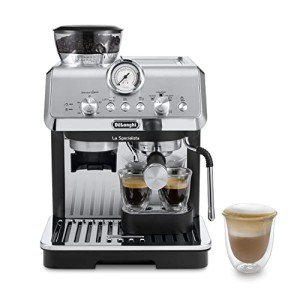Energy-Efficient Espresso Machines: A Comprehensive Guide
In the world of coffee enthusiasts, espresso machines are frequently considered essential devices for brewing abundant, aromatic coffee. However, the energy consumption associated with these machines can lead to increased energy costs and ecological issues. As consumers become more eco-conscious, energy-efficient espresso machines have actually become a popular choice. This short article intends to check out the features, advantages, and alternatives readily available in energy-efficient espresso machines, helping coffee fans make informed choices.
What Makes an Espresso Machine Energy-Efficient?
Energy-efficient espresso machines are created to minimize energy usage while keeping ideal efficiency. Numerous functions add to the energy performance of these machines:
- Insulation: High-quality insulation helps keep heat, reducing the energy required to preserve ideal developing temperature levels.
- Smart Technology: Many modern machines are equipped with programmable settings that enable users to schedule developing times and switch to standby mode when not in use.
- Quick Heat-up Time: Energy-efficient espresso machines often use innovative heating technologies, such as thermoblocks or PID controllers, to heat water rapidly.
- Low Wattage: Machines that operate at lower wattages consume less energy overall, making them more efficient.
- Vehicle Shut-off: Automatic shut-off features make sure that the machine switches off after a specific period of inactivity, further reducing energy waste.
Advantages of Energy-Efficient Espresso Machines
Investing in an energy-efficient espresso machine can use numerous advantages:
- Cost Savings: Over time, lower energy usage can result in minimized electrical power bills.
- Ecological Impact: Using less energy reduces carbon footprints, making these machines a more sustainable option for ecologically conscious customers.
- Improved Performance: Many energy-efficient designs likewise use exceptional developing technologies, resulting in better-tasting espresso.
- Toughness: Typically, energy-efficient machines are built with high-quality elements, leading to greater durability.
Features to Consider
When selecting an energy-efficient espresso machine, several functions need to be taken into consideration:
- Type of Machine: Options consist of manual, semi-automatic, and completely automatic designs, each with varying degrees of user control and automation.
- Brew Quality: Look for machines that use high-quality brewing systems to guarantee ideal taste extraction.
- Maintenance: Some machines have self-cleaning functions that can save energy and effort in upkeep.
- Capacity: Depending on personal or household size, machine capacity can impact energy consumption, with larger machines frequently requiring more power.
Popular Energy-Efficient Espresso Machines
The market offers a range of energy-efficient espresso machines dealing with different needs and choices. Below are some notable designs:
| Brand | Model | Key Features | Energy Consumption |
|---|---|---|---|
| Breville | Barista Express | Integrated grinder, PID temperature level control, quick heat-up. | Low |
| DeLonghi | EC155 | Compact size, easy to use, durable build. | Moderate |
| Rancilio | Silvia | Sturdy style, exceptional temperature level stability, and has a low environmental effect. | Moderate |
| Gaggia | Classic | Trusted manual operation, resilient brass elements, and efficient steaming ability. | Low |
| Jura | E8 | Totally automatic, smart features, and a removable brew group for simple cleansing. | Low |
Tips for Optimal Energy Efficiency
Aside from picking an energy-efficient model, consumers can embrace a number of practices to maximize energy efficiency:
- Preheat: If your machine has a pre-heating function, use it to make sure that the ideal temperature level is reached quickly before brewing.
- Shut off After Use: Always shut off the machine after developing or utilize machines with car shut-off features.
- Routine Maintenance: Keep the machine well-maintained to guarantee it operates effectively and effectively.
FAQs About Energy-Efficient Espresso Machines
1. Are energy-efficient espresso machines more expensive?
While the preliminary financial investment may be higher for energy-efficient models, the long-term savings on electrical energy costs can offset the initial cost. In addition, numerous energy-efficient machines come with sophisticated functions that boost the brewing experience.
2. How do I know if an espresso machine is energy-efficient?
Try to find indications such as Energy Star certification, user reviews, and requirements relating to wattage and heat-up time. Machines with particular functions intended at reducing energy usage are generally created for better efficiency.
3. Can I use an energy-efficient espresso machine for other coffee styles?
Many energy-efficient espresso machines provide flexibility, permitting users to brew different coffee styles beyond espresso, such as lattes and coffees, by incorporating steaming capabilities.
4. Do energy-efficient models sacrifice quality for effectiveness?
Not necessarily. Lots of energy-efficient espresso machines are geared up with high-quality brewing innovation that can enhance flavor extraction while minimizing energy consumption.
5. What Professional Espresso Machines is required for energy-efficient espresso machines?
Regular upkeep includes cleaning the machine, descaling when needed, and occasionally examining seals and gaskets to guarantee optimum efficiency and energy performance.
Energy-efficient espresso machines represent a perfect mix of performance, cost savings, and environmental obligation. By considering different features, advantages, and brands, customers can select a model that matches their distinct preferences while contributing favorably to the environment. As the trend towards sustainable living grows, the appeal of energy-efficient devices, consisting of espresso machines, is most likely to continue its upward trajectory, using coffee fans a guilt-free way to enjoy their everyday dose of espresso.

